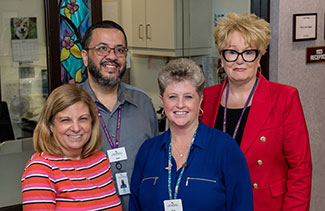Spotlight on: HLRCC Front Office Staff
Posted on
When people walk through the front door of the Leever Cancer Center, they are often not feeling their best. They might be feeling ill or weak from treatments or be confused about where to go. That’s why our valuable front office staff is so important.
 “The front office staff here at The Harold Leever Regional Cancer Center plays a critical role,” says Beth Lepore, Front Office Supervisor. “They are the first people that a patient, family member, or caregiver meets here. We have a positive and calming approach to assist patients and families in a compassionate and professional manner.”
“The front office staff here at The Harold Leever Regional Cancer Center plays a critical role,” says Beth Lepore, Front Office Supervisor. “They are the first people that a patient, family member, or caregiver meets here. We have a positive and calming approach to assist patients and families in a compassionate and professional manner.”
Located at the front window down the hall from the main entrance, the front office staff — which includes Beth and patient representatives Jose, Kathy, and Kim — greets everyone when they come in, gathers the required information, and helps patients figure out where they’re going. “We get a lot of people who say all they know is their doctor told them to go to the Leever Center, so we have to help them get to the correct provider,” says Beth.
With each patient, the team asks for identification, makes copies of COVID vaccination and insurance cards, and makes sure all demographic information is complete, then has them take a seat in the waiting room, where they will be met by a nurse or medical assistant to escort them to their appointment.
“Our job is to ensure patients get to and through their appointment efficiently,” says Beth. “We aim for minimum waiting times in a relaxed setting.” As part of that effort, the front office team is now sending out demographic forms (via mail or email) ahead of time for new consultations, so patients can fill them out beforehand and not feel stressed. “That makes it a lot easier for everyone,” says Beth.
While the front desk staff members are the first point of contact for patients on their way in to the Leever Cancer Center, they also provide assistance to patients on their way out. They help patients schedule follow-up appointments, call a ride service for them, or help them get to the exit if they are in a wheelchair. “We do whatever is needed to support our patients,” says Beth.
